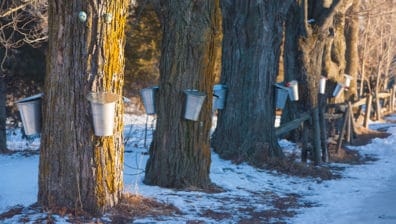Food Insecurity in Vermont and Resources that Can Help

For some people, a daily meal is a simple choice of what to eat—what kind of sauce to make for the pasta, where to get take-out for dinner, etc. But for thousands of people facing hunger in Vermont, a daily meal isn’t a choice between different recipes or restaurants. It’s often a choice between buying food and other critical needs like medicine, bills, or childcare.
September is Hunger Action Month, a nationwide effort to raise awareness and mobilize communities to take action to end hunger. And as Vermont works to recover from the impact of the coronavirus crisis, the need for all of us to take action has never been greater.
Since March of 2020, one in three people in Vermont has experienced food insecurity. Local and national response swelled during this time, including at the Vermont Foodbank, whose food distribution nearly doubled in the first year of the pandemic. Today, despite this huge collaborative effort, increased levels of food insecurity persist, and will for some time, especially for the most vulnerable in our communities.
It has been an extremely challenging 18 months and there’s still a long road ahead, but the Vermont Foodbank has also seen the incredible ways people are showing up for one another during this difficult time. Friends have delivered homemade masks to keep our frontline staff safe, people have donated precious paychecks to make sure a neighbor’s pantry is full, volunteers have shown up in sweltering heat to help get food out the door and onto people’s plates.
More than ever, we understand how much of an impact we can have when we work together.
If you’re interested in joining the fight against hunger, Hunger Action Month is a perfect time. And there are so many ways to take action! You can donate food, funds, or your time to your local food shelf or the Vermont Foodbank (Pro tip: Call them first and find out what they need! You can search your area using the Vermont Foodbank’s Agency Locator tool.)
Enjoy a paperless account, automatic savings, and no overdraft fees with our innovative debit card.
Experience Modern Banking with Edge Pay
HOW TO ACCESS FOOD STATEWIDE
The Vermont Foodbank is the state’s largest hunger-relief organization, providing nourishing food to neighbors experiencing hunger through a network of more than 300 community partners—food shelves, meal sites, senior centers, after-school programs, schools, and hospitals.
If you or someone you know is in need of help getting food, the Vermont Foodbank can help. The following list will help you access food and programs that best fit your needs.
- 3SquaresVT: Has your household lost pay? Have your childcare expenses increased? 3SquaresVT is here for you and your family. You could be eligible to receive a 3SquaresVT benefit or increase the benefit you already receive. The Vermont Foodbank can help you apply. Visit our 3SquaresVT page, email 3svt@vtfoodbank.org, call 1-855-855-6181 or text VFBSNAP to 85511
- Commodity Supplemental Food Program (CSFP): The CSFP is a federal nutrition program that offers free monthly nutrition information and nutritious foods to income-eligible older adults.
- Find a food shelf: The Vermont Foodbank partners with more than 300 community partners across the state. Find a site close to you through our food shelf listings.
- VeggieVanGo: The Vermont Foodbank is working closely with our school and hospital partners to ensure that we can still provide food in communities in ways that don’t promote the spread of the virus. Please contact the site of your local VeggieVanGo for details about VeggieVanGo in your community.
If you have further questions, you can call the Vermont Foodbank at 1-800-585-2265.
ADDITIONAL COMMUNITY RESOURCES
- 2-1-1: The Vermont 2-1-1 database contains detailed descriptions of programs and services available to Vermonters that are provided by local community groups, social service and health-related agencies, government organizations, and others.
- School Meals: This school year, meals are available for kids through local schools, no matter where your child is learning. Meals are also available through some childcare providers. These meals are nutritious and are prepared following strict health and safety guidelines. Contact your child’s school or childcare provider to learn more! If you’re asked to complete a school meal application, please fill it out. Filling out the application helps our communities run meal programs throughout the year and helps make sure schools can get important federal funding.
- Women, Infants, Children (WIC): Vermont WIC is open and most services are offered by phone appointment to align with social distancing efforts. Food lists have been temporarily expanded to add options for some hard-to-find items. Check the expanded food list to see what has been added. Please visit the website or text VTWIC to 855-11 to apply. Click here to connect with WIC in your area. WIC will continue to provide breastfeeding support, nutrition education, and community referrals. If you are pregnant, postpartum, breastfeeding, a caregiver or parent with a child under five you may be eligible for WIC.
- Vermont WIC website links:
- Meal Programs for Older Vermonters: People age 60 and older are especially encouraged to stay at home in order to protect themselves from COVID-19, but staying well-nourished is also critical for your health. To help, you may be able to pick up meals to go or have meals delivered to your home. For more information about meals for older adults, please call the Helpline at 1-800-642-5119.
For more ways to get involved, visit the Vermont Foodbank’s Hunger Action Month webpage. Food shouldn’t be an impossible choice.

You Also Might Like

Stay informed
Stay up to date on financial tips, tricks, and tools that will build your financial literacy and help you live a more prosperous life.



